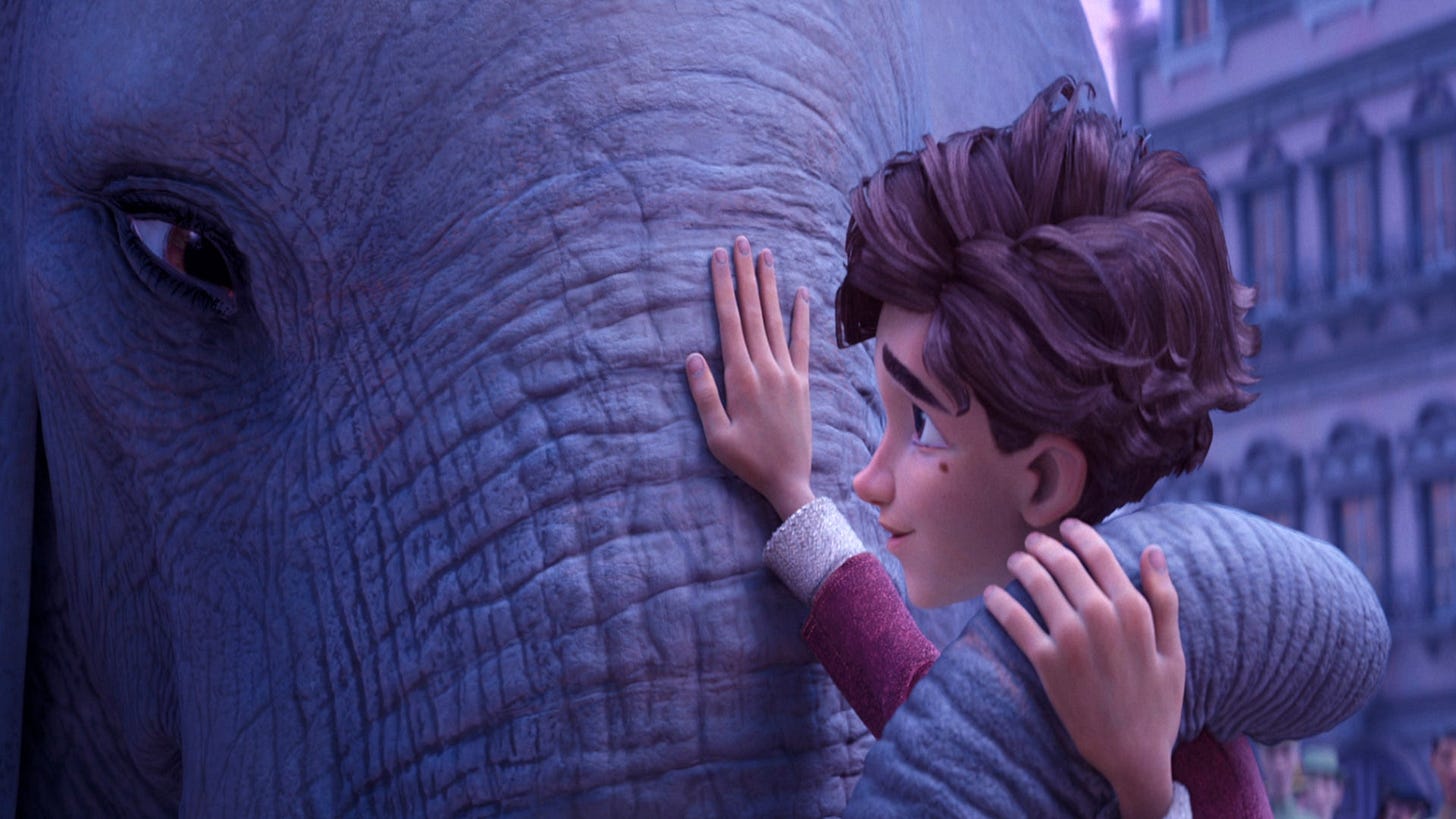The Magician's Elephant
A pleasing but not terribly ambitious animated fable from Netflix about an orphan boy trying to find his way back home in a place that's lost its sense of magic.
I haven’t read Kate DiCamillo’s book, “The Magician’s Elephant,” but it almost seems like it was written with the idea of turning it into a movie. That isn’t exactly a novel experience for DiCamillo, who’s already had several of her books adapted including “The Tale of Despereaux” and “Because of Winn-Dixie.”
So here it is in very colorful animated form on Netflix, with a screenplay by Martin Hynes (“Toy Story 4”) and directed by Wendy Rogers, a longtime visual effects artist making her debut behind the camera.
It’s a pleasing picture of modest ambitions and lower-end animation production. It involves an orphaned boy who has been instructed by a fortune teller that an elephant will lead him to his long-lost sister, from whom he was separated during World War I.
Elephants aren’t exactly a common sight in his sleepy city, but sure enough one literally drops out of the sky. Various adventures and life-lessons ensue.
The storytelling is brisk and contains a well-balanced mix of action scenes, exotic characters and blatant tugs at the heart. If it seems a little derivative of other child-centered stories and mythologies, that’s because it is. It’s the sort of thing to occupy the family for a couple hours of shared entertainment, then filed away.
Peter (voice of Noah Jupe) is about 13, a smart and gentle-hearted kid being raised by Vilna (Mandy Patinkin), a crusty old retired soldier who rescued him during the war. He told Peter that his infant sister was killed along with their mother, so as far as the boy knows he’s all alone.
Vilna isn’t cruel but doesn’t know a lot about raising kids. He makes Peter engage in marching and other exercises to turn him into a good soldier, insisting that he buy a small fish and stale bread every day for their suppers because suffering makes you strong.
Their city of Baltese is a mix of Old Europe and modernity, seeming like it has one foot in the 1920s and the other in the 1600s. Apparently it was once a place of magic, but one day a permanent blanket of dark clouds rolled in, snuffing out the joy. The local countess (Kirby Howell-Baptiste) is famous for having never laughed.
One day Peter is tempted and spends his coin on a fortune teller (Natasia Demetriou, who also narrates) instead of food. She tells him that his long-list sister still lives and he can find her by “following the elephant.”
Such creatures do not exist in Baltese. But that very same evening, an inept traveling magician (Benedict Wong) tries to dazzle his bored audience by trying some of the old magic, resulting in an elephant materializing from nowhere — injuring a haughty old lady, Madam LaVaughn (Miranda Richardson) in the process. She’ll spend the rest of the movie letting him know how he displeased her.
The King (Aasif Mandvi) decides he must come and check out this novelty. He’s a goofy monarch more concerned with entertainment than ruling well and justly. Peter declares that the king must free the elephant and give it to him. As a challenge, the king says the boy must complete “three impossible tasks” to receive his boon.
Peter is helped in his endeavors by Leo Matienne (Brian Tyree Henry), a senior advisor to the countess who also happens to be the downstairs neighbor.
We’re also introduced to Adele (Pixie Davies), an adorable moppet living in the countryside outside Baltese who is the ward of Sister Maria (Dawn French), a nurse who is very fearful about new and strange things. Adele convinces her they must go into the city to check out this amazing elephant. (I think you can put two and two together.)
The elephant itself has no name and does not seem to be magical in any way, although as in most animated movies it has a heightened sense of empathy and wants nothing more than to be returned to its home and family. She attaches herself to the boy as the only human who seems to be a true friend.
You can see the obvious parallel with Peter’s quest, one you can expect to see resolved with a nice bow on it.
I liked a lot of things about “The Magician’s Elephant,” though it’s one of those movies that feels like less than the sum of its parts. The other characters all pass through Peter’s life like pieces of a puzzle he must put together, rather than fully realized people he forms meaningful attachments to.
For instance, there’s a real poetic tragedy to Vilna, a good man limited by his militaristic background. He knows he’s not being a good surrogate father to Peter, but is unwilling to waver from their regimented life. He reminded me, both visually and thematically, of the version of Geppetto we saw in “Guillermo del Toro’s Pinocchio.” A pity he’s mostly relegated to staring out his window with a spyglass.
I also wanted to know what made the countess so sad, and why Leo Matienne is always grasping at some far-fetched idea, like importing pygmy goats or manufacturing parachutes.
It’s not a bad bit of animation, but can feel paint-by-numbers at times.





